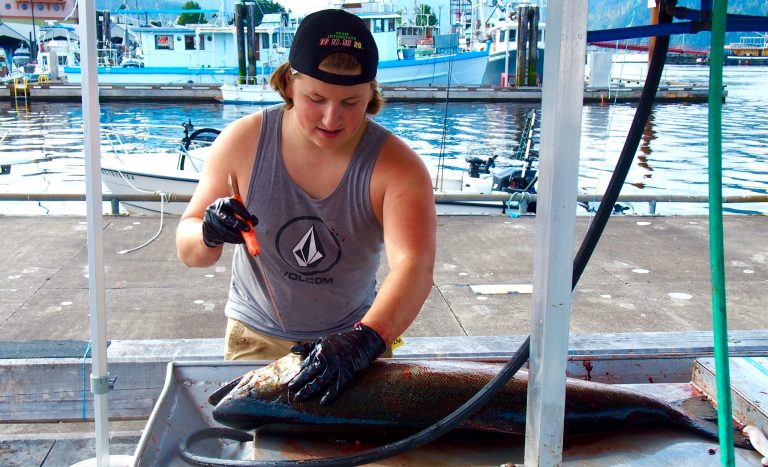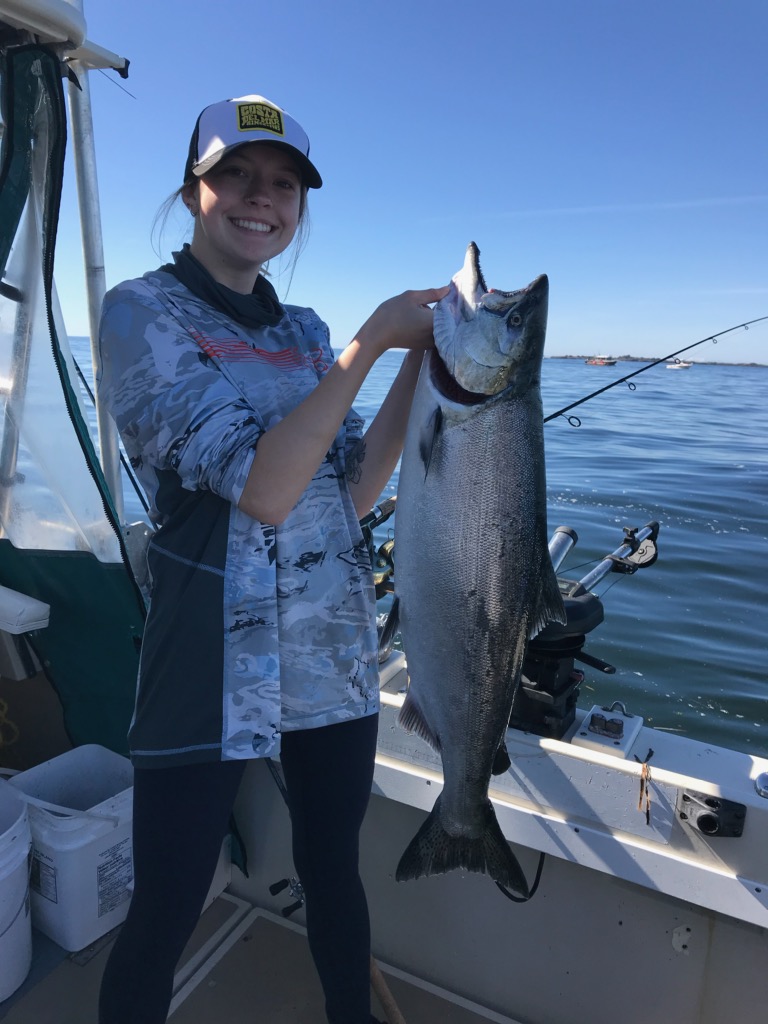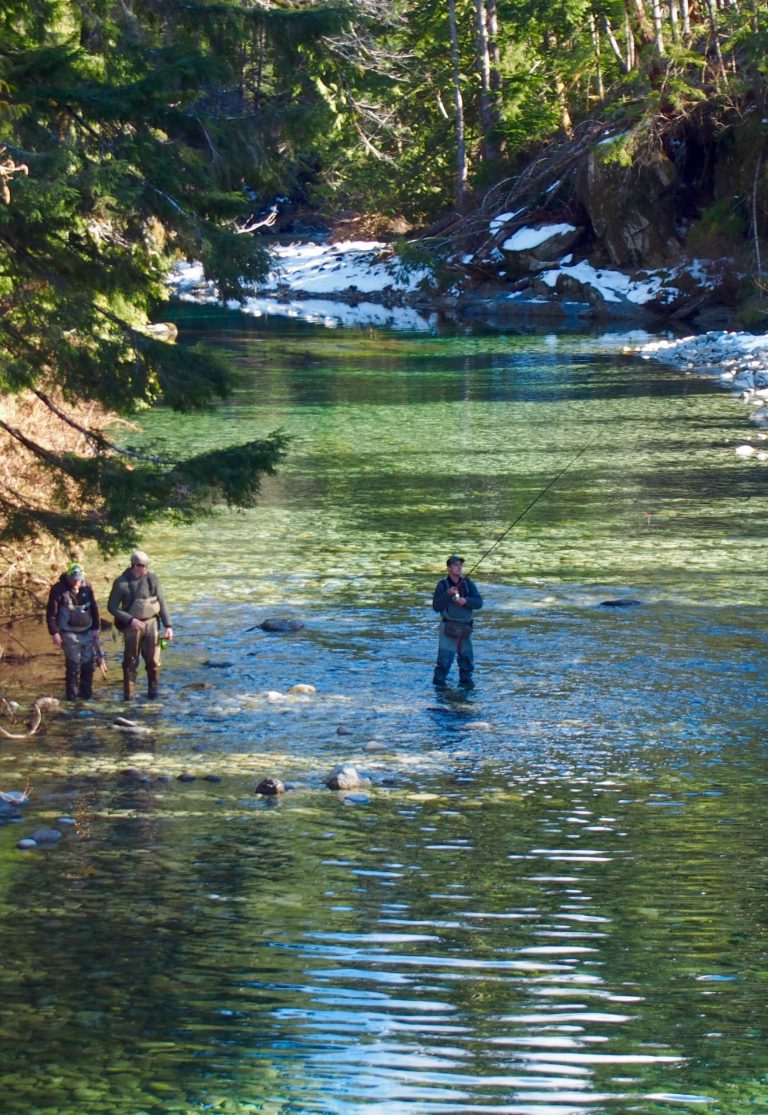Alberni Valley Fishing Capital
Fishing Town Tales Hold True
A friendly rivalry between Port Alberni and Campbell River over the title of Salmon Fishing Capital still sparks a hearty debate among anglers. Alberni Valley Fishing Capital
What warrants Port Alberni’s ‘salmon capital’ title? Plenty, bias admitted.
“I have a brother-in-law in Campbell River and I tease him all the time,” says Bob Cole, a lifelong Port Alberni angler and boating enthusiast. The two Vancouver Island fishing destinations have much in common. Both are seaports and forestry towns that originated as Indigenous settlements going back millennia, rich cultures borne of a close relationship with the sea.
Both towns are famous for salmon fishing and especially for big springs, chinook or “smileys” when over 20 lbs. Both have tyee clubs. Campbell River’s is known for its annual rowing derby going back to 1925. Alberni Valley Tyee Club was founded seven years later, though its derby has always been open to power boats.
There are some distinctions, of course. Alberni Valley, Alberni Inlet and Barkley Sound offer not only by great salmon fishing but an unrivalled variety of recreational fishing opportunities, saltwater and freshwater. Fishing has long been integral to local culture and traditions.
In 2010, the old rivalry took a decisive turn. World Fishing Network held a contest for Canada’s Ultimate Fishing Town. Among 160 entries, Port Alberni won by 30,000 votes. Cole doubts a resident population of 25,000 could have swayed the result without a lot of support from outside the community.
Catch numbers alone tell the story.
“We catch between six and eight times the number of salmon they do out of Campbell River,” Cole said, citing combined results of numeration, creel surveys and flyovers. “I don’t think it’s been any lower than five times.”
Another factor favouring the Central Island is ease of access. Port Alberni is known on the B.C. coast as a small-boat-and-trailer destination, a relatively short drive from other Island centres, in contrast with more distant salmon fishing opportunities on the west coast.
For as long as there have been people living on the Central Island, there has been fishing. Proof of this lies along the shore of Sproat Lake — Kleh-koot in the Nuu-chah-nulth language — where petroglyphs 10,000 years old depict various fish, reflecting their importance to first peoples.
Immigrants in the 19th and 20th centuries were also drawn to the fishing life. Memories of those social ties are credited with helping to revive the Port Alberni club after a brief hiatus a few years ago. There was a strong desire “to have what we grew up with,” says Carolyn Jasken, club president.
“It used to be a real social hub down at the marinas. We used to have dances, banquets, dinners,” Jasken recalls. “The social aspect was biggest.”
The Somass/Stamp river watershed plays a key role. Due to the rivers’ short length — 24 kilometres in all — fish populations are more concentrated. Great Central Lake and Sproat Lake, two of the largest freshwater bodies on the Island, along with many smaller lakes — Elsie, Gracie and Sumner to name a few — that offer trout fishing in abundance.
“We have more salmon kilometres than any salmon river in North America because it’s such as short river system,” Cole said.
Port Alberni, “Alberni Valley Fishing Capital” is known as a small-boat-and-trailer place — a fairly short trip from other Island centres — in contrast with far-flung west coast salmon fishing destinations on the Island. Part of the appeal is ease of access to the outer inlet and beyond.
“In Port Alberni’s favour, the best thing we still have is Robertson Creek,” says Doug Lindores, who operates Silvers Charters. “And people have been instrumental in building small streams with coho.”
Robertson Creek Hatchery, located on the Upper Stamp River, has substantially boosted the rivers’ natural production and helps to sustain commercial, First Nations and recreational fishing opportunities.
“We have few or no restrictions because of the returns of fish are much larger,” Cole says. On the inside waters of the Salish Sea, anglers typically face more fishing restrictions, he notes.
There are unique factors that lend substance to the capital claim. As one example, Cole cites nearby Nahmint River, which still has a steelhead fishery and “where you used to see the real monster chinook, the six- and seven-year-olds.” A theory holds that the Nahmint chinook stock withstood the last ice age, unlike chinook elsewhere.
“By DNA, they found that the fish from the Nahmint River repopulated all the rivers from here to Alaska,” he explains. “That’s a pretty amazing story. They’re quite iconic in many ways.”
Nahmint Bay is closed to fishing protect the stock, but they have made substantial progress on restoring productivity, transplanting brood stock in the lower river. Further down Alberni Inlet lies Barkley Sound, though, which offers superb fishing year-round.
David Murphy grew up fishing in Port Alberni. His father once managed Clutesi Haven Marina. He fondly remembers fishing “as a 14-year-old, in a tin boat, catching a 42-pounder in the harbour.
“Everyone had a boat. The whole town fished. It’s what you did,” he recalls.
Murphy has made fishing his career as a guide and lodge operator. Though Murphy Sportfishing Charters operates primarily on the outer west coast now, Murphy returns for summer steelhead in Port Alberni.
“There’s probably more steelhead in the Stamp than all other Vancouver Island rivers combined,” he said.
Salmon fishing has changed over the decades. Declines in ocean productivity widely believed to be the result of climate change and increased competition for habitat from ocean ranching have affected local fishing over the last 30 years, Murphy says.
Fishing reports vary from season to season with some saying 2019 was better than 2020. In Campbell River’s favour, fishing last summer was the best seen in 20 years, Murphy notes.
And Port Alberni, the Alberni Valley Fishing Capital? The tyee club managed to pull off one of the few fishing derbies held along the coast during a summer when others were cancelled due to pandemic concerns. To be on the safe side, the derby ran without its usual dockside festival. Tickets still sold out.
Jasken sees plenty of room for improving the event in future, making it more inclusive and fun, reinforcing the Ultimate Fishing Town brand that she spearheaded a decade ago.
“We truly believe we are.”
 Written by Mike Youds, at the Valley Vibe. Port Alberni’s fast growing community and online magazine. The passion here at the Valley Vibe is to showcase the beautiful of our valley for all who live here, and travel through. Working together with many talented writers, we at the Valley Vibe love to explore, discover and uncover secret jewels about Port Alberni and Sproat Lake.
Written by Mike Youds, at the Valley Vibe. Port Alberni’s fast growing community and online magazine. The passion here at the Valley Vibe is to showcase the beautiful of our valley for all who live here, and travel through. Working together with many talented writers, we at the Valley Vibe love to explore, discover and uncover secret jewels about Port Alberni and Sproat Lake.











